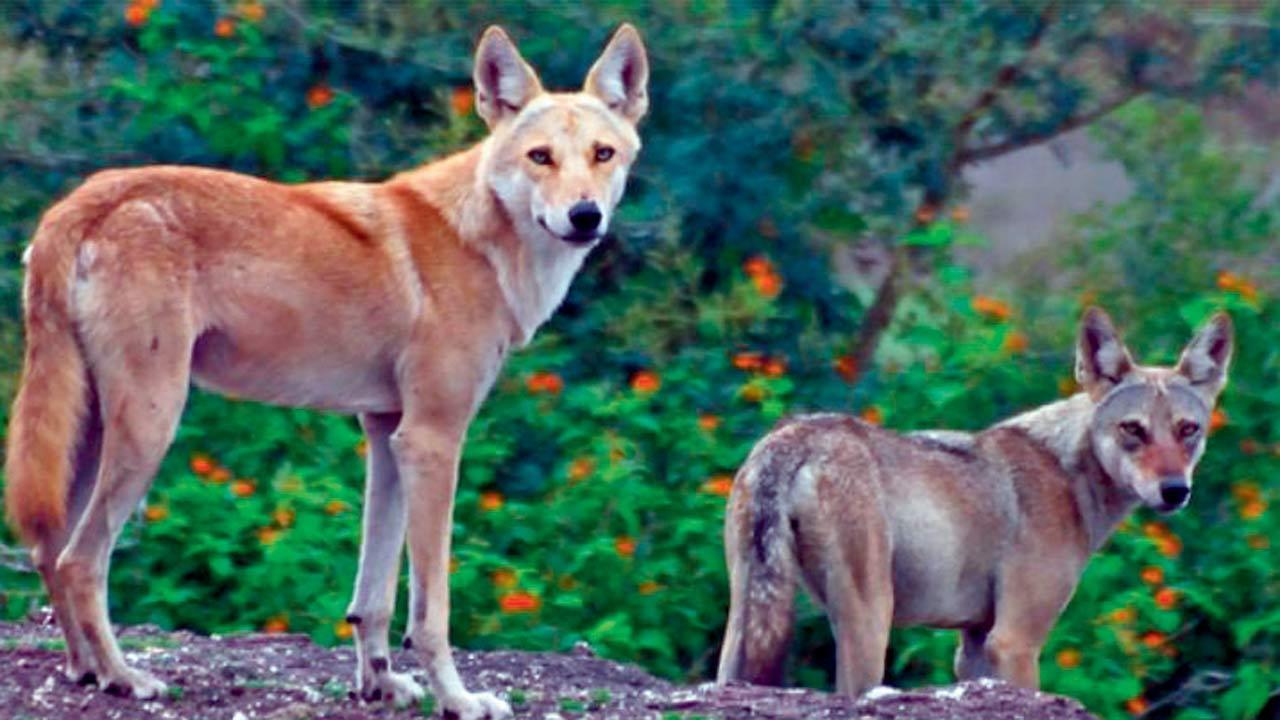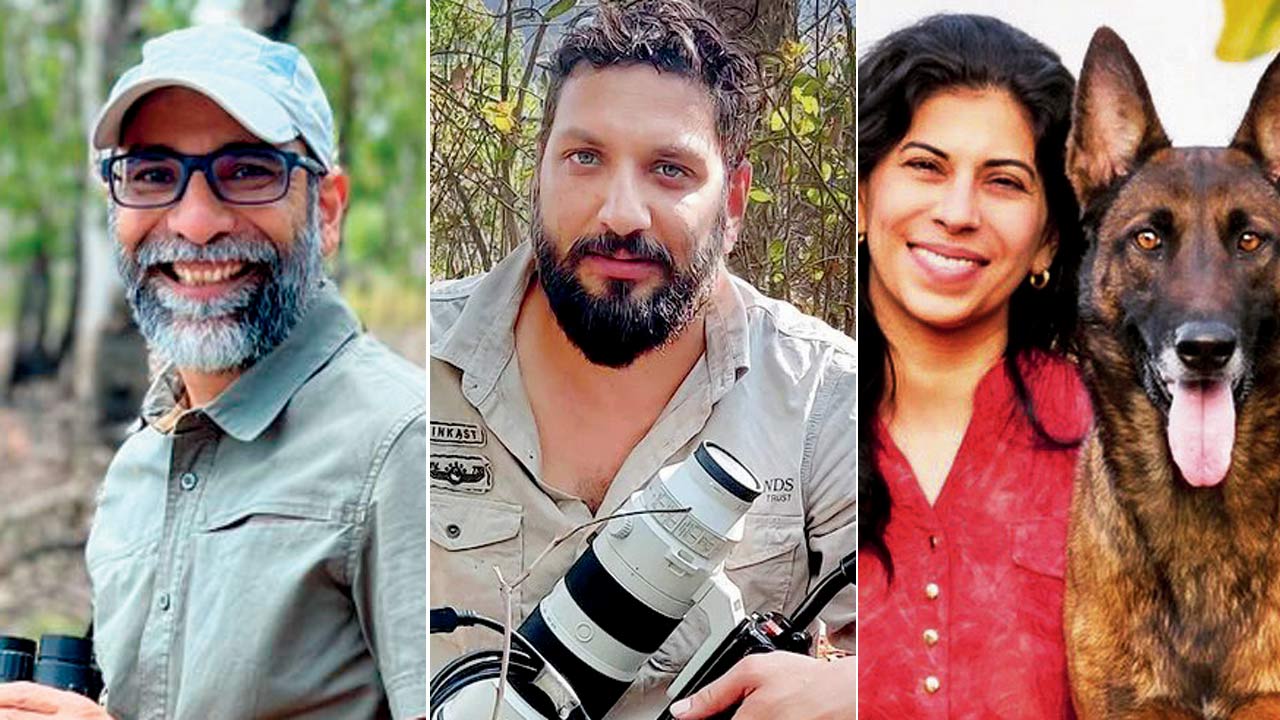With the confirmation of the presence of wolfdogs on the outskirts of Pune, scientists and behaviourists warn that they should not be kept as pets

The behavioural aspects of these hybrid wolfdogs are still under observation, but early findings suggest that they exhibit behaviours typical of wolves, having been born into wolf packs. Pic/The Grasslands Trust
In 2014, sightings of what looked like hybrids between stray dogs and wolves in Saswad, on the outskirts of Pune, caught the attention of conservationists and canine enthusiasts. However, there was no scientific confirmation of the new fledgling species.
Since then, it has been a long journey for The Grasslands Trust, a charitable trust working towards the conservation of Indian canidae and their habitats to prove the natural hybridisation. They secured permission to collect the species’ fur and stool sample and run genetic tests at the National Centre for Biological Sciences in Bengaluru—it took a decade for them to prove that hybridisation between dogs (canis familiaris) and wolves (canis lupis) is real.
The Indian grey wolf (Canis lupus pallipes), the apex predator in the grasslands of Maharashtra, is affected the most by this. The grasslands of Saswad, Morgaon, and Jejuri belt in Maharashtra, are one of its last breeding bastions.
 Dr Abi Tamim Vanak, Mihir Godbole and ShirinDhabhar, Canine Behaviourist
Dr Abi Tamim Vanak, Mihir Godbole and ShirinDhabhar, Canine Behaviourist
The lead scientist on the project, Dr Abi Tamim Vanak, senior fellow and director at the Centre for Policy Design, at Ashoka Trust for Research in Ecology and the Environment, Bengaluru, told mid-day about their findings. “Our studies have confirmed ongoing hybridisation,” he says, “And there is evidence of second-generation hybrids that have mated with pure wolves.”
This process, known scientifically as introgression, involves the introduction of dog genes into the wolf population, altering the genetic integrity of wolves. Vanak explains, “While dogs have descended from wolves, domestication has made them smaller, physically less powerful and less adept at hunting—skills that are not beneficial for the wolf population. So, the introduction of dog genes into the wolf population is detrimental to the latter.”
The behavioural aspects of these hybrids are still under observation, but early findings suggest that they exhibit behaviours typical of wolves living in packs, and working for the clan, having been born into wolf packs, Vanak said. “One possible reason for this hybridisation could be the low wolf population in the region, leading a female wolf to mate with a [free-roaming] dog,” Vanak said.
On the total population of wolves in Maharashtra, Vanak said that since they are not forest-dwelling animals, it is difficult to determine their total population in the state as they dwell in grasslands spread of thousands of square kilometres. Mihir Godbole, founder and president of The Grasslands Trust and one of the researchers on the project, estimates that there are about 35 to 40 breeding wolves in and around Pune.
Canine trainer and behaviourist Shirin Dhabhar sheds light on the dynamics of this match, saying, “This can’t be termed a behavioural change [in mating patterns] as wolves avoid human-populated areas and are always suspicious of them. They are extremely shy creatures. While dogs share some feral instincts with their prehistoric relatives, they generally fear wolves, which are stronger, more skilled hunters, and apex predators.” According to her, the most likely scenario is that a dog wandered into the wolves’ territory, leading to the hybridisation.
Dhabhar also cautions against the growing fascination with keeping wolfdogs as pets. “Wolves are gorgeous animals, but within just eight months, a wolfdog can exhibit behaviours typical of actual wolves—becoming solitary and potentially aggressive,” she says. “The romanticised notion of owning a wolfdog fades quickly when people realise the challenges of taming these instincts.”
Adding to the fascination, Amey Deshpande, a Pune-based breeder, who deals in toy breeds, says that while the craze for wolfdogs is less pronounced in cities such as Mumbai and Pune, it is more prevalent in the north, especially in cities such as Delhi, Ludhiana, Jalandhar, where people often keep challenging breeds such as Pitbulls and Rottweilers. Maharashtra has a few wolfdog breeders who sell only on demand, claims Deshpande. Since these crossbreeds live close to human population, Vanak said that they should be treated as wolves, given their similar characteristics—like avoiding human contact and staying cautious of the human population.
Echoing Dhabhar’s concerns, Vanak also addressed the legal and ethical issues surrounding the fascination with wolfdogs. While laws in some Western countries may permit keeping them as pets, Vanak warned that in India, this is an offence under the Wildlife Protection Act, 1976. He stressed that this poses risks to both the animals and their owners. “Such fascinations should be avoided,” he said, adding that “even though hybridisation occurs naturally, these species should be left in the wild, where they belong.”
Also Read: World Wildlife Day 2024: Experts share safe hacks to deal with wildlife animals in human-dominated spaces in Mumbai
 Subscribe today by clicking the link and stay updated with the latest news!" Click here!
Subscribe today by clicking the link and stay updated with the latest news!" Click here!








